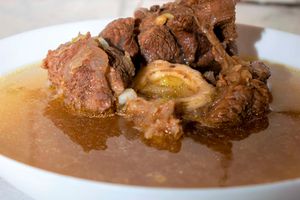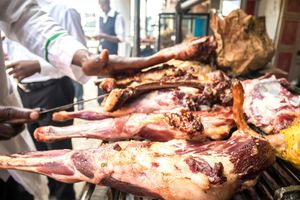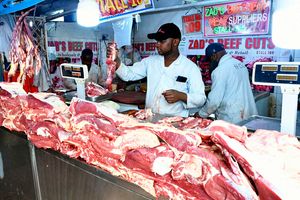
Dr Jonathan M. Mueke(left), the Principal Secretary, State Department for Livestock Development and other guests visit a stand during the third edition of the Kenya Meat Expo at KICC, Nairobi, on June 12, 2024. The event is organised annually by the Nation Media Group.
The Ministry of Agriculture and Livestock Development is pushing for the training of butchery operators to ensure that the meat consumed by Kenyans meets established food safety standards.
Through the State Department for Livestock, the ministry is advocating for meat attendants to undergo short courses in proper meat handling.
In an interview with Seeds of Gold, Dr Joshua Chepchieng, Secretary of Administration at the department, said the training will equip those handling livestock products with the skills necessary to supply safe meat for human consumption.
Dr Chepchieng expressed concern that the meat industry in Kenya has remained largely informal for years, operating without clear guidelines or safety standards.
Currently, most food business operators only receive basic sensitisation from public health officers, primarily focused on food handling and wearing lab coats.
According to Dr Chepchieng, there is no further training for meat handlers beyond that.
He emphasised the urgent need for both butchery operators and facility attendants to be trained in hygienic meat handling.
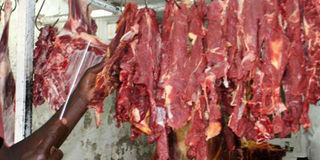
Meat displayed in a butchery.
“The attendants need to be taken through capacity-building training to improve their practices,” he said, adding that many workers in the meat value chain lack the necessary skills and knowledge.
To address the skills gap, Dr Chepchieng revealed that the State Department for Livestock is working on rolling out short courses on meat handling at the Meat Training Institute (MTI).
The government-run facility specialises in training personnel in the meat industry, particularly those involved in veterinary public health and meat processing technology.
Located in Athi River, Machakos County, the institute also offers courses in hygienic meat production and inspection. “We are looking forward to offering short-term courses at an affordable fee.
"We will first target butchery operators near the institute in areas such as Athi River, Mlolongo, and Kitengela, before scaling up the programme to other places,” Dr Chepchieng explained.

A butcher cuts meat at his butchery. Butcheries in Kajiado are shutting down due to lack of business.
This call for the initiative comes just weeks before the 2025 Kenya Meat Expo and Conference, a national event organized annually by Nation Media Group PLC.
The expo showcases different types of livestock meat, meat-handling technologies, cooking recipes, value addition techniques, and processing innovations, among other products around the meat industry.
Ms Wambui Mbarire, CEO of the Retail Trade Association of Kenya (RETRAK), which also represents businesses in the meat sector, stressed the need to diversify meat preparation knowledge among Kenyans.
“Most people only know how to prepare nyama choma (grilled meat). With broader culinary skills, we can expand the market for meat products,” she said.

Meat on display in a butchery.
Dr Chepchieng also noted that the Food and Feed Safety Control Coordination Bill, 2023, which is in its final stages of approval, will significantly improve the handling of food products in Kenya, including meat and meat products.
Once enacted, the law will establish clear guidelines and standards that will boost the country’s visibility and competitiveness in the global food export market.
“There is great potential for our meat and meat products internationally. To fully tap into that potential, we must ensure we are offering high-quality, safe meat,” he stated.
The bill aims to establish a coordinated framework for food and feed safety in Kenya, enhancing public health and consumer protection. It proposes the creation of the Office of the Food Safety Controller, defines the role of county governments in food safety, and mandates the development of a Multi-Annual National Control Plan.
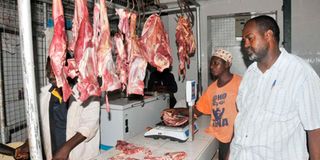
A customer buys meat at Marikiti market in Mombasa in 2020.
Alongside efforts to train meat handlers, the government also plans to introduce a digital tagging system to identify livestock and monitor rearing practices across the country.
The digital tags will be equipped with Global Positioning System (GPS) technology, which will provide real-time data on location, time, movement, and direction. This initiative is expected to enhance the traceability and safety of livestock products such as meat, milk, eggs, and leather, making them more competitive in global markets.
According to a 2024 report by the State Department for Livestock, Kenya’s beef cattle population is estimated at 16.3 million. While most of the beef is produced from rangelands, culls from dairy cattle also contribute significantly to the national supply.
In 2023, the country produced 237,907 metric tonnes of beef, valued at Sh129.5 billion.
Sheep and goats also play a vital role in the livelihoods and food security of pastoralist communities due to their short reproductive cycles, adaptability, and diverse feeding habits.
Kenya has an estimated 34.9 million goats and 23.2 million sheep. These produced 77,521 metric tonnes of chevon, worth Sh53.9 billion, and 51,691 metric tonnes of mutton, worth Sh34.2 billion, respectively.
In addition, Kenya produced 93,622 metric tonnes of poultry meat from 68.9 million birds, valued at Sh34.7 billion, 40,055 metric tonnes of pork from 840,160 pigs, valued at Sh19.5 billion, and 55,204 metric tonnes of camel meat from 4.3 million camels, valued at Sh32.5 billion, among other livestock products.

